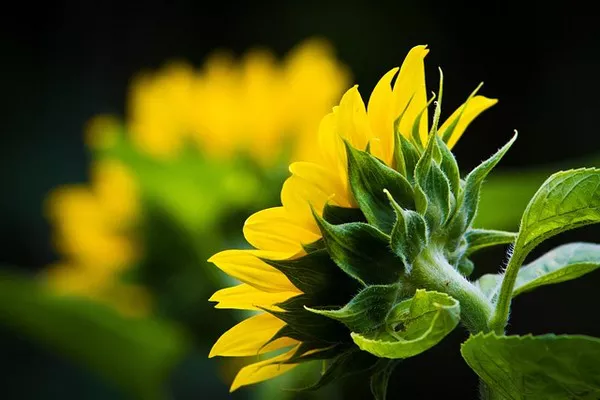Sunflowers, with their vibrant yellow petals and towering stalks, are not just nature’s cheerful masterpiece. They carry a profound and timeless symbolism that transcends their radiant appearance. The sunflower, scientifically known as Helianthus annuus, is much more than a botanical wonder; it is a symbol of positivity, adoration, and resilience. In this article, we will delve into the multifaceted meanings and cultural significance of sunflowers, exploring why they have fascinated and captivated humans for centuries.
Historical Significance
The sunflower’s journey through history is a fascinating one. Native to North America, sunflowers have been cultivated and revered by various indigenous tribes for over 3,000 years. These tribes recognized sunflowers not only for their beauty but for their practical applications as well. Sunflower seeds, which are an integral part of the plant, were often harvested for their nutritional value. Early European explorers, upon their arrival in the New World, were introduced to this vibrant plant and quickly spread its cultivation throughout Europe.
In the 18th century, Russian settlers were among the first to widely cultivate sunflowers, using them for both food and oil. This legacy continues today, as Russia remains one of the largest producers of sunflower oil. The symbolism of sunflowers took root in Russian culture, representing the sun and spiritual significance.
Positive Vibes and Optimism
One of the most universally recognized meanings of sunflowers is their association with positivity and optimism. Sunflowers are often dubbed “the happy flowers” because their radiant, golden petals closely resemble the sun. The sun, with its life-giving warmth and light, has long been a symbol of hope and positivity. Sunflowers mirror this brilliance, symbolizing a bright outlook on life and a desire for a sunny disposition.
The vibrant yellow petals of the sunflower can brighten any room and lift one’s spirits. In art and literature, sunflowers have been used to represent a positive attitude, resilience in the face of adversity, and the power to overcome challenges. Their cheerful appearance is a reminder that even in the darkest of times, there is potential for growth, change, and happiness.
Adoration and Loyalty
In the language of flowers, known as “floriography,” sunflowers convey adoration and loyalty. They symbolize a strong, unwavering bond and can be given as a token of love, friendship, or admiration. The sunflower’s habit of turning to face the sun throughout the day is often seen as a reflection of loyalty and dedication, much like the unwavering devotion of a friend or loved one.
Throughout history, artists have depicted sunflowers in romantic settings, further cementing their connection with adoration. The famous series of sunflower paintings by Vincent van Gogh is a striking example of this sentiment, where the artist used sunflowers to symbolize his deep affection for his friend and fellow artist, Paul Gauguin.
Spiritual and Cultural Significance
Sunflowers have also held spiritual significance in various cultures. For instance, in Native American traditions, sunflowers were often associated with the sun deity, representing life, vitality, and renewal. They were used in rituals, ceremonies, and as offerings to invoke the blessings of the sun.
In Hinduism, the sunflower is linked to the deity of the sun, Surya. It is offered to deities in temples and is associated with devotion, enlightenment, and spiritual growth.
In Russia, sunflowers are not only a major agricultural crop but also have deep cultural and symbolic roots. They are seen as a symbol of good luck and prosperity and are often given as gifts during celebrations and festivals.
Victory and Resilience
Sunflowers have been used to symbolize victory and resilience in many contexts. The belief in the sunflower’s ability to withstand harsh conditions and still thrive is a metaphor for the human spirit’s resilience. This symbolism can be traced back to the sunflower’s native origins in North America, where it endured various environmental challenges.
In the context of World War I, the sunflower became a symbol of remembrance and resilience, much like the red poppy. Sunflower fields became a place of solace and remembrance for soldiers who had experienced the horrors of war. Their vibrant presence in such bleak surroundings served as a reminder of the enduring human spirit.
In modern times, the sunflower has been adopted as a symbol of resilience and hope in the face of adversity. It has been used in various movements and campaigns to represent strength, unity, and the ability to overcome challenges.
Growth and Potential
The sunflower’s unique growth pattern is another facet of its symbolism. Sunflowers have the remarkable ability to grow tall and strong, reaching for the sun’s nourishing rays. Their spiral pattern of seeds, referred to as the “golden ratio” or “Fibonacci sequence,” is a symbol of perfection and growth in the natural world.
This growth symbolism has led the sunflower to be associated with personal development, self-improvement, and the pursuit of one’s full potential. It serves as a reminder that, like the sunflower, individuals have the capacity to grow, adapt, and reach new heights. It encourages us to embrace change and strive for personal growth.
Conclusion
Sunflowers are more than just a pleasing sight in nature; they encompass a myriad of meanings and symbolism that span across cultures, time, and art. These radiant blooms symbolize positivity, adoration, loyalty, resilience, and growth, making them a powerful emblem of the human experience. Whether presented as a gift, grown in a garden, or painted on a canvas, sunflowers continue to brighten our lives and remind us of the enduring strength and beauty within us all. In a world often characterized by uncertainty and challenges, sunflowers stand as a timeless reminder of the power of optimism, love, and growth.


